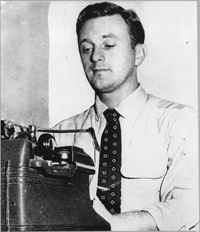John Seigenthaler, 1927-2014
Legendary journalist John Seigenthaler has died at his home in Nashville
John Seigenthaler—revered reporter, editor, author, and advocate for books, civil rights, and the First Amendment—died today at his Nashville home after a long struggle with colon cancer. He was eighty-six.
 Seigenthaler, the oldest of eight siblings, was born in Nashville on July 27, 1927, to parents with literary inclinations. As he told the late John Egerton in a wide-ranging 2012 interview for Chapter 16, both of the elder Seigenthalers read to their children: “It was a nightly habit, and they each read, I guess, from their own background of interest,” he said. “I remember my mother started with the Junior Classics and graduated to Shakespeare. She was reading Shakespeare to me by the time I was seven or eight years old.” Seigenthaler got much of it down by heart, able to remember great swatches of Shakespeare right to the end of his life.
Seigenthaler, the oldest of eight siblings, was born in Nashville on July 27, 1927, to parents with literary inclinations. As he told the late John Egerton in a wide-ranging 2012 interview for Chapter 16, both of the elder Seigenthalers read to their children: “It was a nightly habit, and they each read, I guess, from their own background of interest,” he said. “I remember my mother started with the Junior Classics and graduated to Shakespeare. She was reading Shakespeare to me by the time I was seven or eight years old.” Seigenthaler got much of it down by heart, able to remember great swatches of Shakespeare right to the end of his life.
Though he did not make a life in the theater, this preparation set the stage for Seigenthaler’s professional career nonetheless: “I memorized. And, you know, it made school so much easier. And then if you listen to all that reading, when the time comes to write, you’ve got something.”
 After a stint in the Air Force, Seigenthaler returned to Nashville in 1949, ready to write. In 1954, as a young reporter for the Tennessean, he once saved a suicidal man’s life by preventing him from jumping from what was last year renamed the John Seigenthaler Pedestrian Bridge. But his journalistic efforts on behalf of social justice were only just beginning: he went on to become a forceful voice for civil rights and First Amendment freedoms alike. As editor of the Tennessean, according to an obituary in USA Today, “he led coverage of the civil rights movement when most Southern newspapers, including the rival Nashville Banner, ignored the growing resistance to racial segregation in the South. Seigenthaler also exposed corruption in the Teamsters union, grave deficiencies in the state’s mental health system and illicit activities of the Ku Klux Klan in Tennessee. And he inspired several generations of journalists to greatness.”
After a stint in the Air Force, Seigenthaler returned to Nashville in 1949, ready to write. In 1954, as a young reporter for the Tennessean, he once saved a suicidal man’s life by preventing him from jumping from what was last year renamed the John Seigenthaler Pedestrian Bridge. But his journalistic efforts on behalf of social justice were only just beginning: he went on to become a forceful voice for civil rights and First Amendment freedoms alike. As editor of the Tennessean, according to an obituary in USA Today, “he led coverage of the civil rights movement when most Southern newspapers, including the rival Nashville Banner, ignored the growing resistance to racial segregation in the South. Seigenthaler also exposed corruption in the Teamsters union, grave deficiencies in the state’s mental health system and illicit activities of the Ku Klux Klan in Tennessee. And he inspired several generations of journalists to greatness.”
In 1961, Seigenthaler briefly left The Tennessean to serve in the Justice Department. That May, “as a representative of Robert Kennedy, the attorney general,” reports an obituary in The New York Times, “Seigenthaler was beaten when a mob attacked a busload of Freedom Riders in Montgomery, Ala. He was hit on the head with a lead pipe and suffered a concussion while trying to protect a young woman.”
Representative John Lewis, now a congressman from Georgia, was also beaten that day, and he issued this statement on learning of Seigenthaler’s death:
John Siegenthaler was an award-winning reporter, a respected publisher, a military veteran, and a heroic public servant. He was a wonderful man who was honorable and good to the core. As a representative of President John F. Kennedy and Attorney General Robert Kennedy, he literally put his body on the line during the Freedom Rides to protect Susan Wilbur from being attacked by an angry mob in Montgomery. Earlier in his career as a reporter, he also saved a man’s life who was threatening to jump off a bridge. That was John Siegenthaler. He always went beyond the call of duty.
He was a newspaper man at heart who represented the highest tradition of journalistic integrity and reporting. He used the power of the pen to help make this country a better place. He was a skillful negotiator, the consummate professional, yet he was a humble, down-to-earth gentleman who was dedicated and committed to his family and friends. He was proud of his Southern heritage and loved to talk about growing up in Nashville. He was brave and courageous, unafraid to stand up for what he believed was right. John Siegenthaler was a beloved friend. My thoughts and prayers are with his family. He will be deeply missed.
 In addition to his work at the Tennessean, Siegenthaler served as the first editorial director of USA Today, as chairman of both the John F. Kennedy “Profiles in Courage” Awards and the Robert F. Kennedy National Book Awards, and as founder of the First Amendment Center, which now bears his name. For more than forty years, he hosted Nashville Public Television’s A Word on Words, a weekly interview program featuring prominent novelists, journalists, and historians from around the country.
In addition to his work at the Tennessean, Siegenthaler served as the first editorial director of USA Today, as chairman of both the John F. Kennedy “Profiles in Courage” Awards and the Robert F. Kennedy National Book Awards, and as founder of the First Amendment Center, which now bears his name. For more than forty years, he hosted Nashville Public Television’s A Word on Words, a weekly interview program featuring prominent novelists, journalists, and historians from around the country.
Seigenthaler is survived by Dolores Seigenthaler, his wife of fifty-nine years; his son John Michael Seigenthaler, a news anchor for Al Jazeera America; daughter-in-law Kerry Brock; and his grandson, Jack.
To read a timeline of John Seigenthaler’s life, click here. To read John Seigenthaler’s full interview with John Egerton for Chapter 16 click here.
For more updates on Tennessee authors, please visit Chapter 16’s News & Notes page, here.